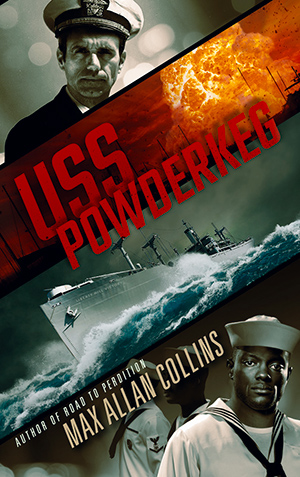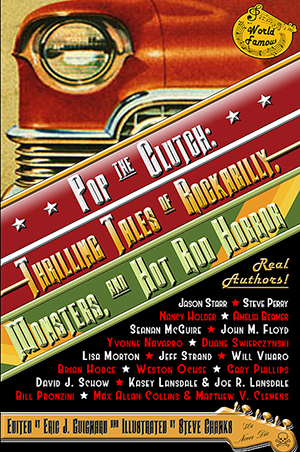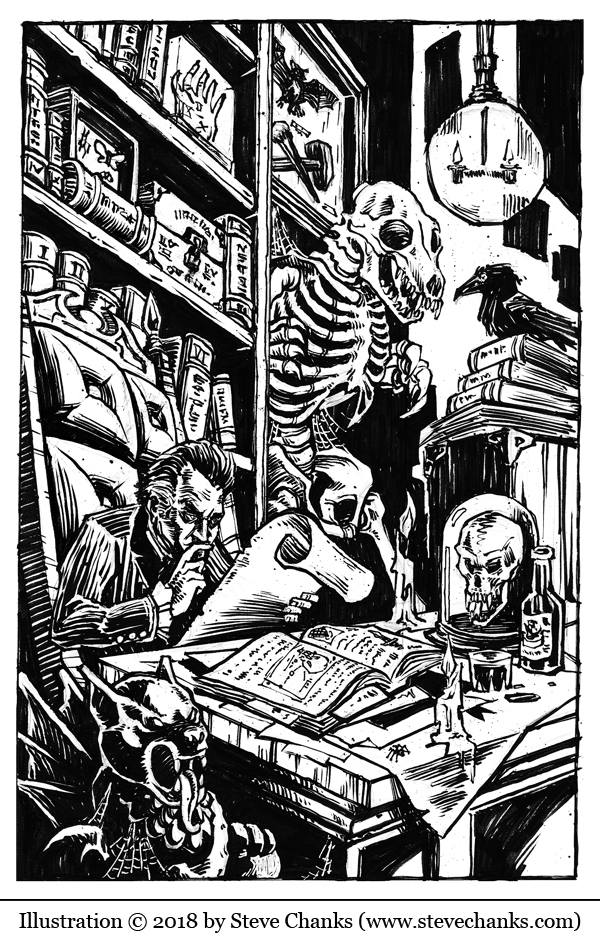USS Powderkeg will be available on February 1. You are unlikely to find it in a bookstore, so go to Amazon or Barnes & Noble or BAM! iTunes has it, too – read about that here.
Info about the book itself is available at Brash Books.
We have used the cover before, but this book – finally under my preferred title with my revised text – is important to me and will require some effort on your part to lay hands on it. This is the novel based on my late father’s experiences in World War II as one of a handful of white officers on an ammunition ship whose crew was otherwise African-American.
After shrugging off our disappointment at Scarface and the Untouchable not getting nominated for an Edgar – my “shrugging off” included expressing how pissed off I was, on Facebook – my co-author, A. Brad Schwartz and I are digging in to make some corrections and additions to the upcoming trade paperback edition (June 4).
This will include a new preface as well as bonus material (in the style of DVD extras) that will focus on the newly discovered case file of one of the Untouchables, which serves to underscore and further verify our conclusions about Ness and how he and his team have been underestimated and short-changed by history.
We are also prepping for a visit to the Mob Museum in Las Vegas over Valentine’s Day, about which more will appear here next week. Brad has also been out on the stump by himself somewhat, as I have been burrowed in, here in very cold Iowa, working on novels. Yesterday day I completed the new Quarry novel, Killing Quarry – although I will be re-reading it and tweaking it and such for a few days this week.
Anyway, among Brad’s adventures in promoting our book (did I mention the criminal overlooking of this major tome by the MWA true crime committee?) included this fine interview.
Speaking of the MWA committee’s neglect, someone I trust has suggested the intimidating length of the book probably put some or all of the committee members off. I suspect some truth might be found in that opinion. Having served on MWA committees, I know it’s a fact of life that the committee members are swamped with books to read in full. On the other hand, the advance notices (particularly the fine mini-review from Grand Master Sara Paretsky) should have encouraged them to do so, anyway.
What can you do to help make the pain go away? Well, if you attend Bouchercon this year, you can vote for Scarface and the Untouchable in the non-fiction Anthony Awards category.
I know I plan to.
Hey, I realize this is undignified and sour grapes and boo-hoo-hoo. I have a love/hate relationship with awards, anyway (love to be nominated, hate not to be, and also losing). But awards as respected as the Edgars bring new readers to the nominated works and especially those that win. They have importance only in that regard, because otherwise it’s just a bunch of subjective nonsense.
I feel much the same way about reviews. I want good reviews not because I need validation, but because more readers will come to the books. I would be lying if I said bad reviews don’t matter to me, because they do, and not just in the sense that they discourage readers (sometimes, oddly enough, such reviews don’t always work that way). But it hurts to have something you’ve put hard work into savaged and/or dismissed, particularly when a smart reviewer nails you for something you’re guilty of.
What hurts about Scarface and the Untouchable is the work, and the years of research, that went into it. I am less angry about this for myself and more for my co-author, whose research (building on my original research in Heller and Ness novels) has upended conventional wisdom about Capone and his tax woes, and Ness and the lack of respect and credit he gets, from those who resent how Hollywood portrayed him. Brad did a stellar, mind-boggling job.
He deserved better.
As I mention, I finished Killing Quarry yesterday, and will dig into minor revisions throughout the rest of the week. I have a particularly full plate this year, which is why I have written three novels in four months – Murder, My Love with Mike Hammer; the Caleb York novel, now entitled Hot Lead, Cold Justice (my original title, The Big Die-Off, deemed too obscure); and now Killing Quarry. Very shortly I will begin serious work on Girl Can’t Help It, the prequel to the forthcoming Girl Most Likely, a task for which I’ve allowed several months. This will be followed by my draft of Antiques Fire Sale (Barb’s working on her draft now), which I have allowed another month for.
This is, of course, insane. Why do I work so hard? Why is somebody who has five doctor’s appointments with specialists this month behaving like this? Should I slow down? Barb thinks I should.
But I like doing this. I really do. And – while I feel fine and all my reports so far (the dentist today) have been positive – when you are 70 and in a month or so will be 71, you sense that maybe you don’t have all the time left in the world to tell your stories.
And I came here to tell stories.
All of which is prelude to what I want to discuss today. Would you agree that everybody has bad days? Various kinds of bad days, of course – from the simple out-of-sorts day to the depressed-about-bad-news day (not getting an Edgar nomination for a ground-breaking book, to just pull an example out of the air) to the nothing-is-going-right day to…you get the idea.
Now I’m not talking about a sick day (in my business, cold and flu generally don’t count – open-heart surgery does) or a day when tragedy has struck a loved one or friend. Nothing like that. Your favorite aunt dies? Take the day off with my blessing!
No, just that typical terrible, horrible, no good, very bad day.
When you are writing on a six-day-a-week schedule, with a deadline bearing down, you write anyway. Writer’s block is not allowed, and I never have it, anyway. Recently I thought I had finally encountered this mysterious, possibly mythical beast – I could not get a single workable thing on paper. I always start with a rough draft, knowing that I’m creating the clay for me to shape into sculpture. But this time, I couldn’t get anything on paper worth building on.
Why?
Well, turned out I was effing exhausted! Just flat-out fried. So I took a two-hour nap, as elderly folk are wont (and permitted) to do. When I got up from my snooze, the words flowed. Maybe not like wine, but definitely Coca Cola.
During the writing of Killing Quarry, I had perhaps three bad days – one of them Edgar-related, which of course I won’t go into. Ironically, one of that sorry trio was the last day of the process – the day on which the crucial last chapter was written.
Knowing I was facing a key part of my story, I considered taking the day off – it was Sunday, after all – and just letting my batteries recharge. But I hadn’t run this race to goof off just shy of the finish line. Plus, all of the plot stuff was filling my brain and assembled into good order – I knew exactly what needed doing.
So I did it.
It was something of a slog. I usually do three drafts of every chapter, then give it to Barb, who gives me notes, and I make minor corrections and revisions (sometimes they’re major – Barb has great story sense), and I’m done till the final read-through. Yesterday I did three drafts, took an hour nap, then came back and did another draft. Barb did her read-through and I made a few revisions and corrections from her notes. If you’re keeping score, that’s an additional draft or pass on the chapter.
Now, here is the lede I’m burying (why is it spelled “lede” not “lead”?) (and why don’t I just Google that and not bother you about it?): how does inspiration figure into a working fiction writer’s process?
I would imagine all of us have bursts of inspiration, sometimes entire work session-long ones. Maybe some writers feel inspired for days or even weeks – trust me, they don’t feel like that all the way through a project. Everybody has bad days, remember?
There are two kinds of writers – the ones who can only write on their inspired days, and who navel-gaze on their (many) off days; and the writers who are thankful for the inspired days that God or luck or somebody or some thing grants them, and who on their bad days soldier on. March through the mud to victory, or at least the end of the work day.
Now here is the real dirty little secret about inspiration – the inspired work and the struggle-to-get-through-it work are always of the same quality. When you go back and read through your story or novel, and recall the passages that came easily as if by automatic writing, those passages won’t be any better or worse than the stuff that came hard.
Or anyway those passages shouldn’t be.
Inspiration is just the days the work is going well. If you are any good at all as a writer, you will develop standards that you will not allow yourself to fall below, before you press on. You stay at it till the work you had to work hard at reads just as well as the work that came easy.
This story about Black Panther’s Oscar nominations mentions a certain other comics-derived film that once-upon-a-time received five nominations (hint: Road to Perdition).
A cry goes out to reprint the Marshall Rogers Batman comic strip. Who was it wrote that again? (Hint: me.)
Finally, Scarface and the Untouchable made Otto Penzler’s Mysterious Bookshop best of the year list, as chosen by the staff – see “Mike’s Picks” on page three.
M.A.C.









